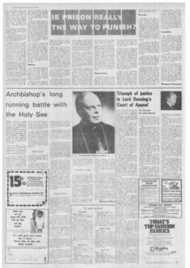Page 3, 30th July 1976
Page 3

Report an error
Noticed an error on this page?If you've noticed an error in this article please click here to report it.
Tags
Share
Related articles
Ope Of The Space-age
Workers Ask To See Pope
Problems Facing Spanish Bishops
Plane To Spain And Reflections On A Reign
'letter From Mexico
Spanish State no longer to nominate bishops
By Luis Ignacio Seco
SEVERAL hours of "suspense" preceded a somewhat surprising event of historical nature. On July 15 Pope Paul received the head of the Royal Household, the Marquis of Mondejar, in special audience, as the bearer of an all-important message from King Juan CarlosI. The same night, in Madrid, the were in The same night, in Madrid, the were in contents of this message the streets: the King of Spain m had communicated to the Pope his desire no longer to use his privilege to nominate Spanish bishops, and in this way was ready to renounce a right which had been granted to the Spanish State by the Holy See almost Five centuries before. This news was acclaimed with great satisfaction by the Spanish public, which is Catholic in its majority. Many people are of the opinion that the young King's gesture will, during the coming months, facilitate the solution of many problems in corporated in the he corporated in the he "anachronistic" Concordat of 1953, the revision and bringing up to date of which becomes an ever-increasing necessity. It goes without saying that it will be for the Government to take the legal steps necessary for this decision to become ratified, but it has been the King who has, with certain political agility, made the first move to break the barriers. This pric,ilege, conceded by the Holy See towards the end of the XV century to the Kings of Spain, was confirmed in the Concordat of 1851, suspended during the Second Spanish Republic (1931-1936), renewed in favour of General Franco in 1941, and confirmed 12 years later by the Concordat of August 27, 1953. It consisted of the following: at such time when it might become necessary for the nomination of a new bishop, the Spanish Government and the Papal Nuncio would draw up a list of six names to be presented to the Pope; the Pope in turn would choose three names from that list for remittance to the Head of State, who would be responsible for the final choice.
Difficulties
It is not surprising, therefore, that this renouncement of a "temporal" right on the part of the Spanish State has provoked the hierarchy of the Spanish Catholic Church similarly to renounce other no less "temporal" privileges, which were the cause of certain difficulties in the necessary liberty between both societies. In fact, it has been those privileges of the ecclesiastic hierarchy, conceded also by the Concordat of 1953, that have in the past halted the State in renouncing theirs. By 2,055 votes in favour, and eight opposing (and there were 70 Spanish bishops in attendance in Rome) the Vatican Council II requested complete liberty for the Church in nominating their bishops, and invited civil authorities "spontaneously to renounce, after consultation with the Holy See, all rights or privileges" which were enjoyed due to pact or
Custom.
blog comments powered by Disqus









